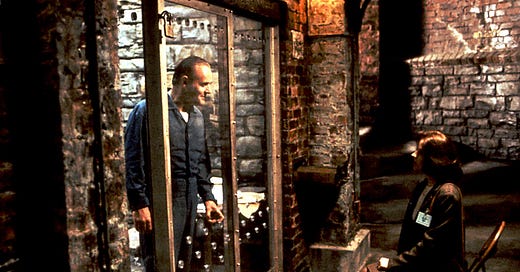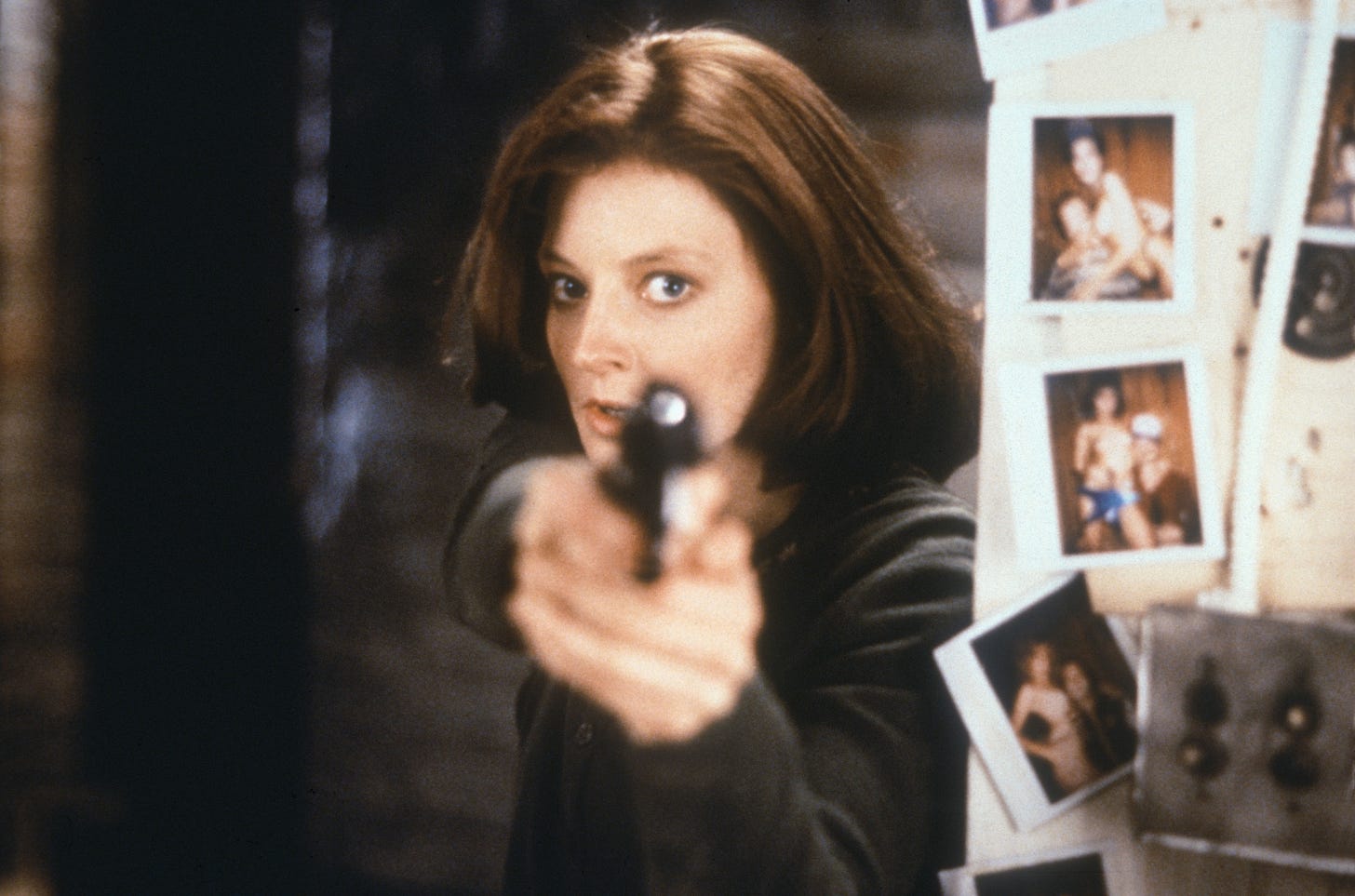Spoilers for The Silence of the Lambs (1991). Trigger warnings for discussion of sexual assault and misogyny.
It’s strange to think that arguably the most iconic scene in The Silence of the Lambs – the first meeting between Clarice Starling (Jodie Foster) and Hannibal Lecter (Anthony Hopkins) – happens just 15 minutes into the film and represents the bulk of their time together on screen. Their verbal sparring and grudging respect dominate the film but make up such a small amount of the running time.
While their initial meeting might remain in the public consciousness because of the very quotable performance by Hopkins, the scene holds far more importance in the development of Foster’s character. Her position as a young woman in the male-dominated FBI training programme informs events from the very start.
Her boss, Jack Crawford (Scott Glen), purposefully sends her unprepared to meet Lecter, hoping to use her gender to coax him into revealing information about Buffalo Bill (Ted Levine). Dr Frederick Chilton (a truly slimy performance from Anthony Heald), who heads up the facility where Lecter is kept, talks down to her because she is a woman and tries to coerce her into a date. When this is unsuccessful, he attempts to scare her with images of Lecter’s victims, highlighting her perceived vulnerability as a woman.
While Lecter may command their initial meeting, the build-up to it and their conversation is focused on showing the audience (without any blatant, indelicate scripting) that Starling is having to fight harder than the men on her programme to succeed. She is having to fight harder in life, in general, because of the stereotypes and threats to women that exist in our society.
By the time she takes that now-famous walk down the corridor of cells, Starling has been mistrusted, sexualised, and subtly threatened for refusing to go out with a man. Her walk to his cell is filled with more graphic interactions – notably with the prisoner Miggs (Stuart Rudin). Cleverly, director Jonathan Demme positions the camera so that we always feel the events and interactions from her perspective. When speaking with Starling, the other characters often talk directly to the camera, while the camera is just off-centre, or includes both characters when she is speaking. As the audience, we are made to feel every misogynistic barb thrown her way.
Lecter, while not quite as overtly, also works to belittle Starling. He’s intrigued by the young woman but relishes the opportunity to twist the situation to his advantage. His mock outrage at being sent a trainee devolves into needling attempts to embarrass her. He smells the air to reveal the skin creams and perfumes she uses, which makes her visibly uncomfortable, he forces her to reveal the misogynistic details of not only what Miggs said to her as she entered the prison, but also the unfunny origins of the Buffalo Bill name.
Despite the cell and the security, as a man, Lecter is shown to have all the power in their encounter. He’s particularly pointed with the line “Thrill me with your acumen” implying that Starling is not qualified enough to give a valid opinion. The double meanings behind these words highlight the cleverness of the script. On the surface, Lecter is referencing her trainee position, but following several minutes of Starling dealing with the various shades of misogyny, it’s hard not to think that her gender plays a role in Lecter’s dismissiveness.
Even as he reads the questionnaire Starling has been instructed to give him, Lecter leans back, smiles at her and winks. He’s as close to catcalling her as you could imagine him getting. His next line, where he mimics her Southern accent was reportedly ad-libbed by Hopkins, the accent throwing Foster off-guard.
He points to her ambition, which women are often criticised for. He implies that her taste is tacky; the taste of a woman with ideas above her station, desperate to escape a poor background by presenting an image. When talking about her background, he quite quickly turns to assumed sexual encounters, in the backseats of cars, allowing local boys to fumble and grope her while she looks for escape.
When Starling bites back and challenges him, he shuts the conversation down. Again, he has the power. He has nothing to lose, while she (held to different standards due to her trainee status and gender) has everything at stake.
Does he redeem himself slightly at the end of the scene? When walking away from his cell, Starling once again passes Miggs, who feigns injury before throwing semen at her. After 20 minutes, we have seen Starling go through nearly every form of misogynistic treatment, from mansplaining, negging, and threats, to humiliation and, finally, a sexual assault. Lecter calls her back and offers his assistance with catching Buffalo Bill, kickstarting the story and showing a small level of kindness.
Lecter’s misogyny isn’t ingrained, nor it is built around any beliefs he has of women. It was a tool to humiliate Starling. Humiliate a young woman who was sent simply to do a job. As Starling tells Crawford later in the film:
Jack Crawford: Starling, when I told that sheriff we shouldn't talk in front of a woman, that really burned you, didn't it? It was just smoke, Starling. I had to get rid of him.
Clarice Starling: It matters, Mr Crawford. Cops look at you to see how to act. It matters.
As a character, Starling has no illusions about the difficulties she faces. Her rebuke of Crawford’s apology highlights the need for men to stand with women and call out misogyny when they see it. Crawford acknowledges this, but only after he is out of earshot from the police force. Lecter does this with Miggs, changing his stance with Starling and ultimately coercing Miggs into suicide, but it’s too little, too late. If you’re willing to humiliate women to a point, and only call it out when it crosses some line, then you’re not really an ally at all.
Foster would take this role just three years after starring in The Accused, where she played a rape victim whose previous actions are used to blot her character and create a narrative where she was ‘asking for it’. Both films, taken as a rather grim double-bill, highlight the inequality that women still face when striving for fun, success, or simply a life without being intimidated.
Director: Jonathan Demme
Writer: Ted Tally. Based on the novel of the same name by Thomas Harris
Starring: Jodie Foster, Anthony Hopkins, Ted Levine, Scott Glen









